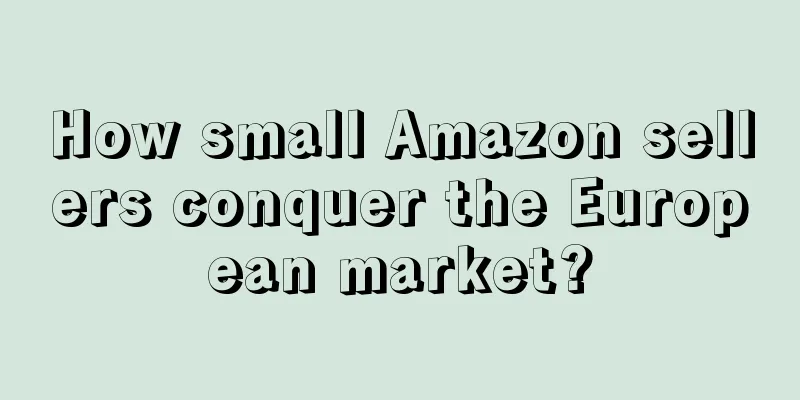As the world's second largest cross-border e-commerce market, the European site is a love-hate existence for sellers. What they love is its mature e-commerce environment, which has a trillion-dollar scale and is growing rapidly every year; but what they hate is that the different VAT policies in different countries make them very troubled. In addition, with the Brexit incident, it is unknown what changes will happen in the future.
Sellers from all walks of life are worried and unwilling to give up. After all, such a large-scale e-commerce market and Europeans' high-quality consumption habits cannot be easily replaced by other markets. I try to persist, but I am powerless. I don’t know when new rules will be issued, and I will face the risk of being blocked if I am not careful. As logistics and tax issues in Europe become increasingly severe, governments around the world are issuing tax compliance decrees and strengthening supervision of tax issues on the Amazon platform. European compliance issues have become a headache for Chinese sellers.
As we all know, Europeans have always been rigorous and attach great importance to product quality and rules and regulations. The previous operation mode without tax numbers and packaging is naturally not feasible. Since compliance is an inevitable trend, it means that if you want to continue to gain a foothold in the European market, you must reorganize your compliance ideas and plan your European site after Brexit.
Today, I will help you sort out your thoughts on European compliance, start anew, and set sail in the European market.
1. European tax VAT registration
When it comes to compliance, the first thing that comes to mind is VAT. This is very important. Europeans generally have a strong sense of taxation, so they naturally attach great importance to investigation and punishment in this area. Subject to the EU VAT distance sales rules, any seller in Europe who exceeds the local sales quota is required to register for local VAT. Also, those who use local warehouses in European countries, including FBA warehouses, and those who try to set up companies in EU countries are required to register for VAT.
Failure to register is illegal, and the national level will require the platform to cooperate with registration. If the requirements are not followed, the platform will be punished, so as a seller you must operate in accordance with the platform regulations; Amazon and other cross-border platforms will, under pressure, first restrict sales, or even stop your sales, and you will face the risk of store closure.
In summary, registering for European tax VAT is a necessity. In addition, after the UK successfully leaves the EU, sellers will need to prepare another EORI number to ensure smooth customs clearance of goods.
2. Multi-language instruction manual
The languages of European countries are very complex and the differences between them are also very significant. There are at least 60 native languages in Europe, and more than 440 languages are used. Today, there are more than 20 official languages in EU member states. The specific proportions are: German 16%, Italian 13%, English 13%, French 12%, Spanish 8%, and Polish 8%.
As a seller on Amazon Europe, if you want to understand buyer needs and create hot products, it is necessary to have a proper understanding of common minority languages.
3. Brand & Trademark Registration
Whether in economically developed Western Europe or in Northern Europe with a higher standard of living, both countries attach great importance to product quality, and attach more importance to it than to price. They have strong market purchasing power and often show great interest in branded, high-quality products.
If Amazon sellers want to impress Europeans with their products, they must first work hard on their brand. Therefore, brand and trademark registration is also an important point.
4. Various certifications
Europeans have always regarded safety as a prerequisite for purchases. If sellers want their products to enter the European market, they need to pass various certifications. Common ones include EN71 certification for toys, EMC electromagnetic compatibility certification for equipment, MDD certification for medical devices, GMP certification for food, and CE safety certification.
In particular, the CE safety certification is regarded as a passport for products to enter the European market and is the main requirement that constitutes the core of European directives. Products affixed with the CE mark can be freely circulated in EU member states.
5. German WEEE certification and ProdSG registration
WEEE: Waste Electrical and Electronic Equipment, which is the recycling instruction for waste electrical and electronic equipment. In order to properly handle the huge amount of electronic and electrical waste and recycle precious resources, the European Union passed two directives in 2002 that have a significant impact on electronic and electrical equipment products, namely WEEE (EU Recycling Directive) and RoHS Directive (EU Environmental Protection Directive). Germany requires Amazon to notify overseas e-commerce companies selling on its platform to register for electronic equipment recycling, and before obtaining a WEEE electronic equipment recycling code, the merchants must be ordered to stop sales.
Currently, Amazon has implemented a policy of forced closure for companies selling cross-border e-commerce products, and products without WEEE registration codes will be forcibly removed from the shelves. Among all European countries, Germany has the most stringent environmental protection requirements, so for sellers, German WEEE must be complied with.
In addition, ProdSG is actually Germany's product safety law, which requires the EU address to be reflected on the product packaging and instructions. For sellers, WEEE certification and ProdSG registration are both essential, that is, the product packaging and instructions must have an EU address, and the product itself must also have WEEE certification.
6. Professional and reliable logistics company
In fact, whether it is Amazon North America or Europe, all sellers need to cooperate with professional and reliable logistics companies. In addition to providing services such as cargo transportation, customs declaration and clearance, and overseas warehouses, high-quality logistics service providers can also provide all the essential services mentioned above for the European station.
For sellers, cooperating with professional and reliable logistics companies can not only easily solve these compliance service issues, but also maximize logistics cost savings and help the majority of sellers better make money in the European market.

